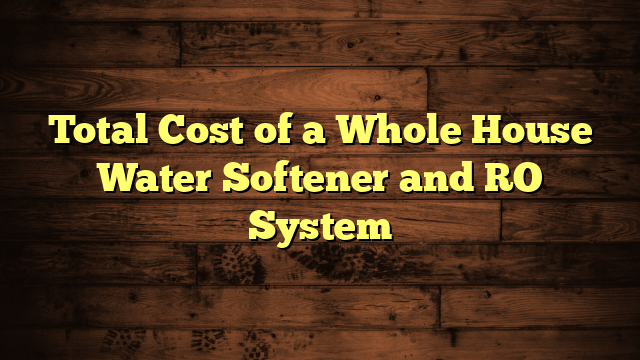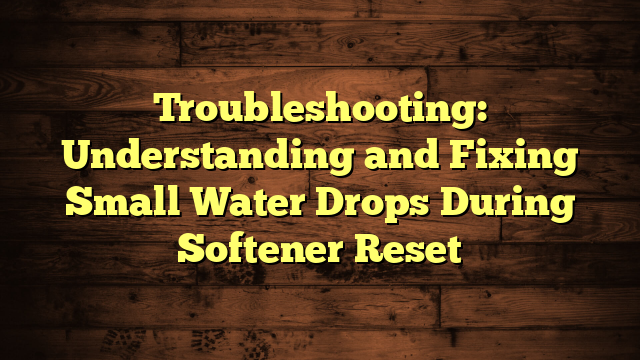How Much Is a Water Softner?
You might be surprised to learn that the cost of a water softener can vary widely based on several factors, including the type and size you need for your home. While basic models start around $400, the price can escalate quickly with advanced systems and installation fees. Understanding these costs is essential for making an informed decision, especially if you're considering long-term savings. So, what should you keep in mind when evaluating your options?
Key Takeaways
- Basic water softeners range from $400 to $800, suitable for small households with lower hardness levels.
- Mid-range models cost between $800 and $1,500, ideal for larger families with additional features.
- High-end water softeners can range from $1,500 to $3,000, offering advanced features and longer warranties.
- Installation costs typically vary from $200 to $1,000, depending on complexity and labor requirements.
- Routine maintenance expenses range from $50 to $150 per visit, ensuring long-term efficiency and system longevity.
Understanding Water Softeners
Understanding water softeners begins with recognizing their purpose: to reduce the hardness of your water. Hard water contains high levels of minerals, primarily calcium and magnesium, which can negatively affect your water quality. By using a water softener, you're engaging in a softening process that replaces these hard minerals with sodium or potassium ions. This not only improves the taste of your water but also enhances its overall usability.
You might notice that soap and detergent work more effectively with softened water, leading to fewer soap scum issues and cleaner dishes. Furthermore, the benefits extend to your plumbing and appliances. Hard water can lead to mineral buildup, which reduces their efficiency and lifespan. By softening your water, you're investing in better water quality for both your household and your wallet.
Installing a water softener can seem intimidating, but understanding how it works demystifies the process. The softening process typically involves a resin tank and a brine tank, where the actual exchange of ions takes place.
This fundamental knowledge equips you to make informed decisions about whether a water softener is a worthwhile addition to your home.
Types of Water Softeners
When it comes to water softeners, you'll find several types designed to meet different needs. The most common option is salt-based systems, which use sodium ions to replace hard minerals like calcium and magnesium in your water.
These systems are highly effective and often recommended for households with considerable hard water issues. They typically require regular salt replenishment, which is an important factor to take into account in your maintenance routine.
Another type you might encounter is magnetic softeners. Unlike salt-based systems, these devices claim to reduce hard water's effects by using magnetic fields to alter the minerals in your water, preventing them from forming scale.
While they're easier to install and require no salt, opinions on their effectiveness vary greatly. Some users swear by them, while others see little to no change in water hardness.
Ultimately, the choice between salt-based systems and magnetic softeners comes down to your specific needs and preferences.
It's essential to evaluate your water quality and household size, as these factors will greatly impact the best option for your home.
Factors Affecting Water Softener Costs
The cost of a water softener can vary considerably based on several factors beyond just the type you choose. Understanding these factors helps you make informed decisions about your purchase.
Here are three key elements that can influence the overall price:
- Water Quality: The hardness level of your water plays a significant role in determining the type and size of the softener you'll need. If you have extremely hard water, you may require a more robust system, which can increase costs.
- System Efficiency: Higher efficiency models often carry a premium price tag but can save you money in the long run. Efficient systems use less salt and water during regeneration, which can lower ongoing maintenance costs.
- Installation Complexity: If your home requires additional plumbing work or electrical adjustments for the installation, expect to pay more. Simple installations can be less expensive, while complex setups may require professional help.
Average Price Range
When it comes to water softeners, understanding the average price range is essential for your budgeting.
You'll need to take into account both the initial purchase costs and any installation expenses that may arise.
Knowing these figures upfront can help you make an informed decision that fits your financial situation.
Initial Purchase Costs
Investing in a water softener can substantially improve your home's water quality, and understanding the initial purchase costs is vital. The price of a water softener can vary widely based on brand comparisons and feature analysis.
Generally, you can expect to pay within the following price ranges:
1. Basic Models: $400 – $800
These usually come with standard features and are suitable for smaller households.
2. Mid-Range Models: $800 – $1,500
These systems often include additional features such as digital controls and higher capacity, making them ideal for larger families.
3. High-End Models: $1,500 – $3,000
Premium units may offer advanced features like smart technology, salt-saving capabilities, and exceptional warranty options.
When choosing a water softener, consider both your budget and your household's specific needs.
A thorough feature analysis can help you identify what's essential versus what's nice to have. Be sure to compare different brands as well, since prices can fluctuate based on reputation and included features.
Installation Expenses
Installation expenses for a water softener typically range from $200 to $1,000, depending on several factors. The complexity of the installation process can greatly impact the final cost. For instance, if you're replacing an existing system, the job might be quicker and cheaper than a new installation requiring additional plumbing work.
Here's a quick breakdown of potential costs:
| Installation Type | Average Cost | Notes |
|---|---|---|
| DIY Installation | $200 – $400 | You'll need installation materials. |
| Professional Installation | $500 – $1,000 | Includes labor and materials. |
| Additional Plumbing Work | $100 – $300 | If extensive adjustments are necessary. |
| Permits & Inspections | $50 – $150 | Depending on local regulations. |
When you decide to install a water softener, consider your skill level and the specifics of your plumbing system. If you opt for professional help, verify that the quote covers both installation materials and labor. This way, you won't be caught off guard by unexpected expenses.
Installation Costs
Installing a water softener typically costs between $800 and $3,000, depending on factors like the system type and your home's plumbing. The installation process can vary, but opting for professional installation often guarantees a smooth experience.
Here are three key factors that affect your installation costs:
- System Type: Different systems, like ion exchange or salt-free softeners, come with varying price tags. Choose wisely based on your water needs.
- Plumbing Modifications: If your plumbing requires adjustments to accommodate the new system, this could increase your costs.
- Labor Costs: Professional installation can save you time and potential headaches. Labor costs vary based on your location and the installer's expertise.
When you factor in these elements, you can better budget for your water softener installation.
Remember, while the upfront costs might seem high, investing in a quality system can lead to long-term savings by protecting your plumbing and appliances.
Maintenance Expenses
Maintenance expenses for a water softener can vary considerably based on the system type and your usage patterns.
Generally, you'll need to factor in routine checks, which should occur every few months. These checks usually involve inspecting the brine tank, ensuring the resin beads are functioning properly, and cleaning the filters. Depending on your system, these routine checks might cost you anywhere from $50 to $150 per visit, especially if you hire a professional.
On top of that, be prepared for potential repair costs. If you experience issues like leaks or a malfunctioning valve, repairs can add up quickly. Minor repairs might set you back around $100, while major fixes can exceed $500, depending on the parts needed.
You can minimize these costs by performing some maintenance tasks yourself, like cleaning the brine tank or checking salt levels.
However, if you're unsure, it's wise to consult a professional. In the long run, keeping your water softener in good shape will help prolong its lifespan and maintain its efficiency.
Long-Term Savings
Investing in a water softener can pay off considerably in the long run. While the initial purchase may seem steep, a detailed cost analysis reveals significant long-term savings.
Here's a quick savings comparison to evaluate:
- Reduced Appliance Lifespan: Hard water can damage your appliances, leading to costly repairs or replacements. Soft water extends their lifespan, saving you money in the long term.
- Lower Energy Bills: Softened water improves efficiency in water heaters and dishwashers. This means less energy is needed, resulting in lower utility bills over time.
- Less Soap and Detergent: You'll notice that you use less soap for laundry and cleaning. Soft water lathers better, which translates to savings on cleaning products.
When you weigh these factors, the savings can add up quickly.
Over time, the investment in a water softener can lead to a substantial return, making it a wise decision for your home. By understanding the potential savings, you can make an informed choice that benefits your wallet as well as your household's overall comfort.
Choosing the Right Water Softener
When choosing the right water softener, you need to take into account both the types available and their sizing and capacity.
Different systems work better for different households, so it's crucial to match one with your specific needs.
Types of Water Softeners
Choosing the right water softener can greatly improve your home's water quality. With various types available, understanding your options is essential. Here are three common types of water softeners to take into account:
- Salt-Based Softeners: These systems use ion exchange technology to replace hard minerals like calcium and magnesium with sodium ions. They effectively soften water and are the most popular choice for households.
- Salt-Free Softeners: Instead of removing minerals, these systems condition the water to prevent scale buildup. They're a great alternative if you want to avoid adding salt to your water.
- Dual-Tank Softeners: Ideal for larger households, these systems have two tanks to guarantee a continuous supply of softened water. While one tank regenerates, the other is in use, preventing downtime.
When choosing a water softener, take into account factors like your household's water usage, the hardness level of your water, and any specific preferences you might have.
Sizing and Capacity Considerations
Getting the right size water softener is essential for ensuring ideal performance and efficiency in your home. When you're choosing a water softener, you need to evaluate your household's capacity requirements. This means understanding how much water you and your family use on a daily basis.
To determine the appropriate size, start by calculating your daily water usage. A general guideline is to estimate that each person in your household uses about 80-100 gallons per day. Multiply this by the number of people living in your home, and you'll get a clearer picture of your needs.
Next, assess the hardness of your water. The higher the hardness level, the larger the capacity requirement for your softener. Sizing guidelines often recommend that a softener should be able to handle about 30,000 to 80,000 grains of hardness removal, depending on your usage and water hardness.
Finally, always check the specifications of the water softener you're evaluating. Ensuring it meets your unique requirements will save you from inefficient performance and ongoing problems down the line.
Choose wisely, and enjoy the benefits of soft water in your home!
Frequently Asked Questions
Can a Water Softener Remove Chlorine From Water?
A water softener isn't designed for chlorine removal. It mainly improves water quality by eliminating hard minerals. If you want to remove chlorine, consider using a dedicated filtration system for better results.
Do Water Softeners Require Electricity to Operate?
Yes, most water softeners require electricity to operate, particularly for regeneration cycles. However, if you're considering softening alternatives, some options don't need electricity, simplifying your water softener maintenance and reducing energy costs.
How Often Should I Replace Water Softener Salt?
Think of your water softener as a garden; it thrives on regular care. You should check salt levels monthly and replace salt as needed to guarantee peak performance. Follow these maintenance tips for a flourishing system.
Can I Install a Water Softener Myself?
Yes, you can install a water softener yourself with DIY installation. It offers you the satisfaction of saving money and understanding the system. Plus, the benefits of automation simplify maintenance and enhance your home's water quality.
Are There Any Health Risks Associated With Water Softeners?
While water softeners improve water quality, some health risks exist, like increased sodium levels. However, they often provide health benefits by reducing scale buildup, which can help your plumbing and appliances function better over time.
Conclusion
In conclusion, investing in a water softener can greatly improve your home's water quality and reduce wear on appliances. Did you know that nearly 85% of U.S. households have hard water? By choosing the right system, you'll not only enhance your daily life but also save on long-term costs associated with hard water damage. Weigh your options carefully, considering model types and installation needs, and you'll make a choice that benefits your home for years to come.







